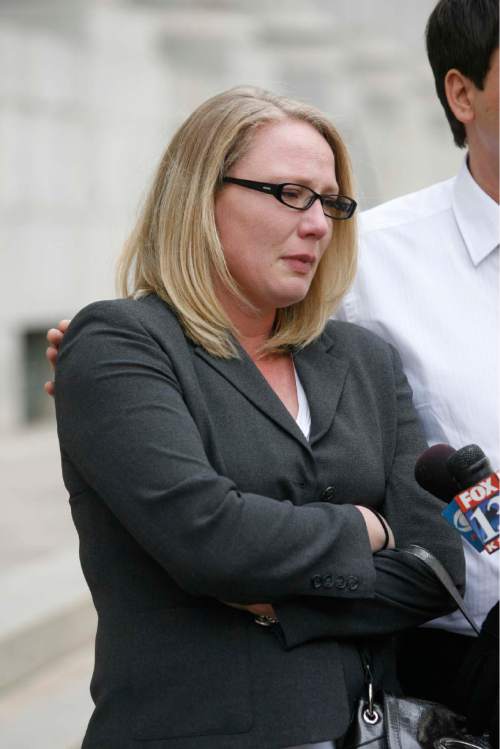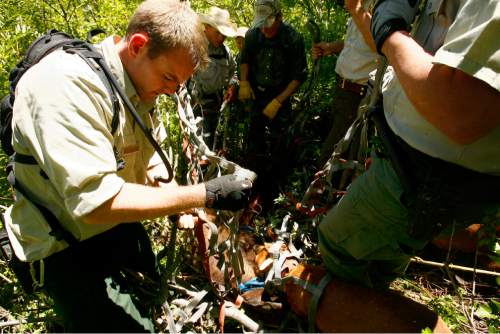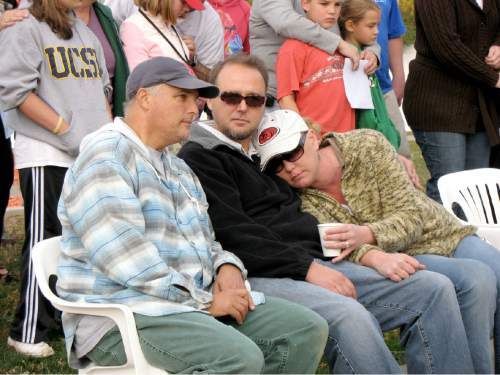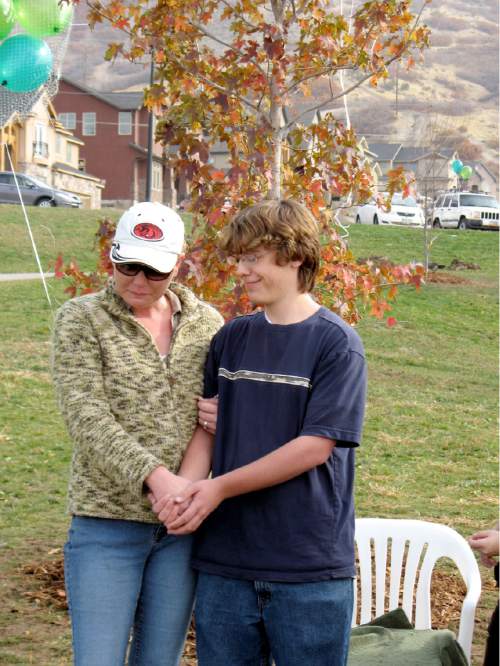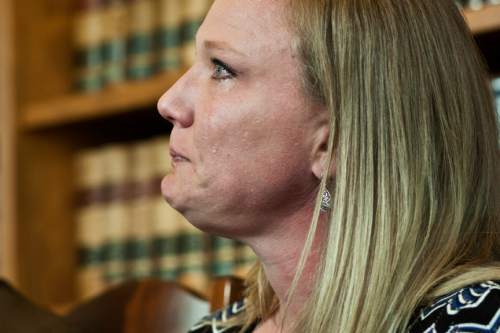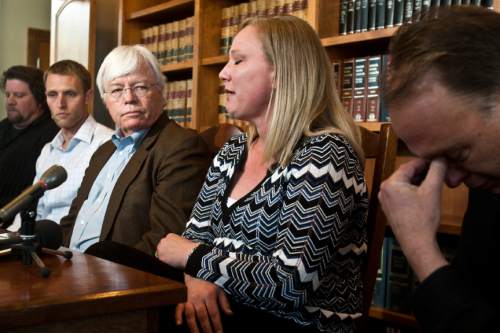This is an archived article that was published on sltrib.com in 2015, and information in the article may be outdated. It is provided only for personal research purposes and may not be reprinted.
The parents of a Pleasant Grove boy who was dragged from a campsite and killed by a bear in 2007 has settled a wrongful-death lawsuit with the Utah Division of Wildlife Resources, according to an attorney for the family.
Samuel Ives, 11, was killed June 17, 2007, during a Father's Day camping trip near the Timpooneke Campground in American Fork Canyon. His body, which had been mauled by a black bear, was found about 400 yards from the family campsite.
The bear was found and killed the next day.
The Ives family sued the state and DWR in 2008, claiming the state was liable for the boy's death because officials failed to warn the public that a dangerous bear was in the area and had attacked other campers.
"Sam's death was 100 percent preventable," the boy's mother, Rebecca Ives, told The Salt Lake Tribune on Tuesday. "The reason that we were so enraged when this happened was not because a bear attacked and killed our son, it was because the federal government and the state had been notified that they had a black bear out there that needed to be put down ... They failed to act and the result was that my son was killed."
The case originally was tossed out by state judges in 2009 and 2011, but the Utah Supreme Court overturned one dismissal in 2013, saying the state had a duty to protect the young boy because DWR officials knew about the bear.
The settlement agreement, hammered out through discussions during the past few months, awards the family financial damages, but fails to require the state to enact new policies or practices related to nuisance wildlife that may pose a threat, Tyler Young, an attorney for the family said Monday.
"Our hope was that the state would implement a 'Sam Alert' for bears that had shown aggressive behaviors toward humans," Young said. "We weren't able to get anything like that."
Young declined to disclose the financial terms of the agreement but said it is less than the statutory cap of $583,900 outlined in the state's governmental immunity law.
Missy Larsen, spokeswoman for the Utah attorney general's office, which represented DWR in the wrongful-death lawsuit, confirmed the settlement Tuesday. Larsen said the agreement includes only financial compensation and does not require DWR to make any changes to its policy or procedures.
A 4th District Court judge still must approve the settlement terms for the agreement to be finalized.
DWR spokesman Mark Hadley declined to comment on any changes the agency may have made on its own in the wake of Ives' death, but expressed "continued condolences" to the boy's family.
"Our thoughts and prayers are with them as they continue to heal from their loss," Hadley wrote in an email statement. "As spring approaches and Utahns head outdoors, we encourage families to be mindful of their surroundings, and to respect wildlife and keep their campsites and cabin areas clean. Doing so will reduce the chance of encountering a black bear."
Ives was asleep when the bear ripped through the side of his tent and dragged away the young boy.
It was the second attack on a camper at the campground in a day — 12 hours earlier, the animal had rummaged through coolers and ripped through another tent, holding down a camper who tried to flee. The bear was frightened away after the camper's friends fired at him with pistols.
After the first attack, DWR officers followed the agency's "internal bear policy," dubbing the animal a "level 3" nuisance bear and setting out to find and kill it. Officers also cleaned the campsite to prevent future bear incidents, but no warnings were posted and the area was not closed.
The Utah Supreme Court ruling said that these efforts to deter the bear "gave rise to a special relationship between the state" and Ives' family members, creating a duty to protect them.
Ives' parents sued the U.S. Forest Service separately in federal court for failing to close the campsite or notify campers about the earlier attack.
Ives' family members had intended to spend the night in the Timpooneke campground, but did not have the $13 for the fee. Instead, they asked if they could camp up the road without paying. A Forest Service employee who spoke with Ives' family about the campground fee said in court that he would have notified the family of the danger if he had been aware of it.
Attorneys for the government argued during a five-day 2011 federal trial that the Forest Service didn't have a duty to take action to close the camp spot because a human fatality caused by a bear had never occurred in the state before the boy's death. Therefore, the agency had no way of knowing the event would happen, they argued.
After the trial, U.S. District Judge Dale Kimball awarded the family a $1.95 million judgment, saying the Forest Service had failed in its responsibility to warn the Ives family of the earlier attack, either verbally, by posting signs or roping off the campsite area. The settlement could have been as much as $3 million, but was less because Kimball said the federal agency bore only 65 percent of the responsibility in the boy's death.
The remainder of the liability fell on DWR for not alerting the Forest Service of its search for a bear it deemed necessary to kill and Ives' family for having food in the campground.
A granola bar wrapper and an open Coke Zero can were inside the tent. Rebecca Ives said she did not know her son had taken the snacks into the tent, but added that the family knew that leaving food out at their campside could attract wildlife and had put their coolers and garbage in their vehicle before going to bed.


